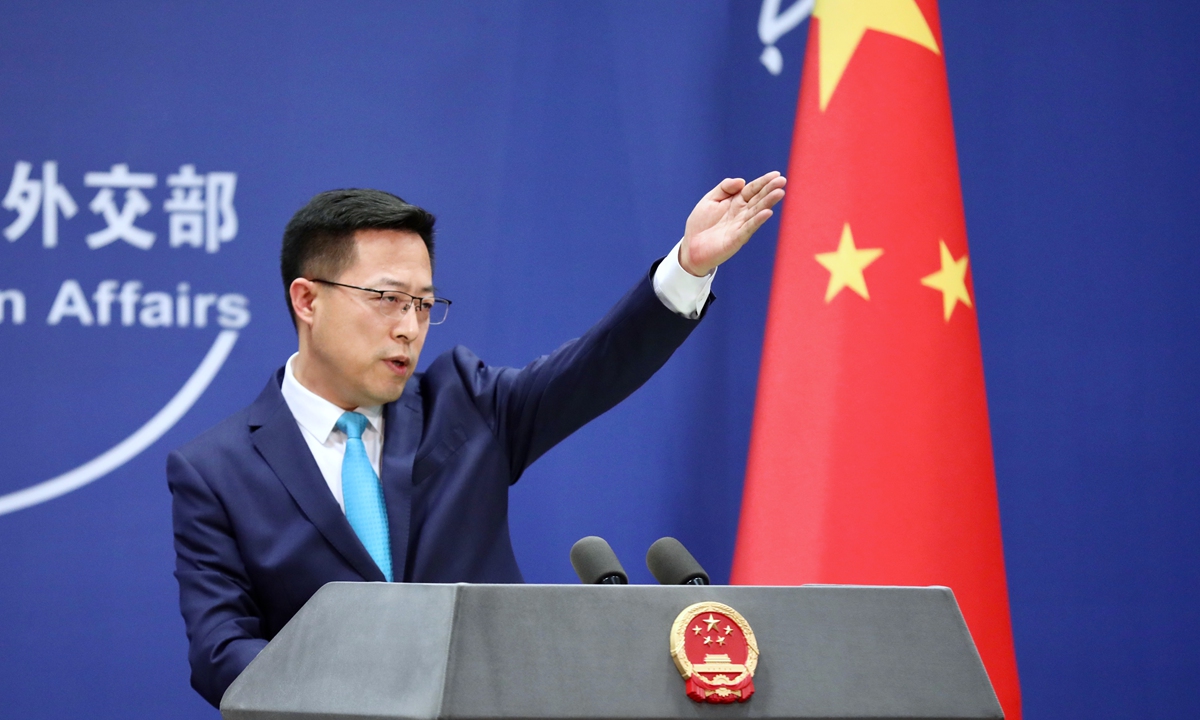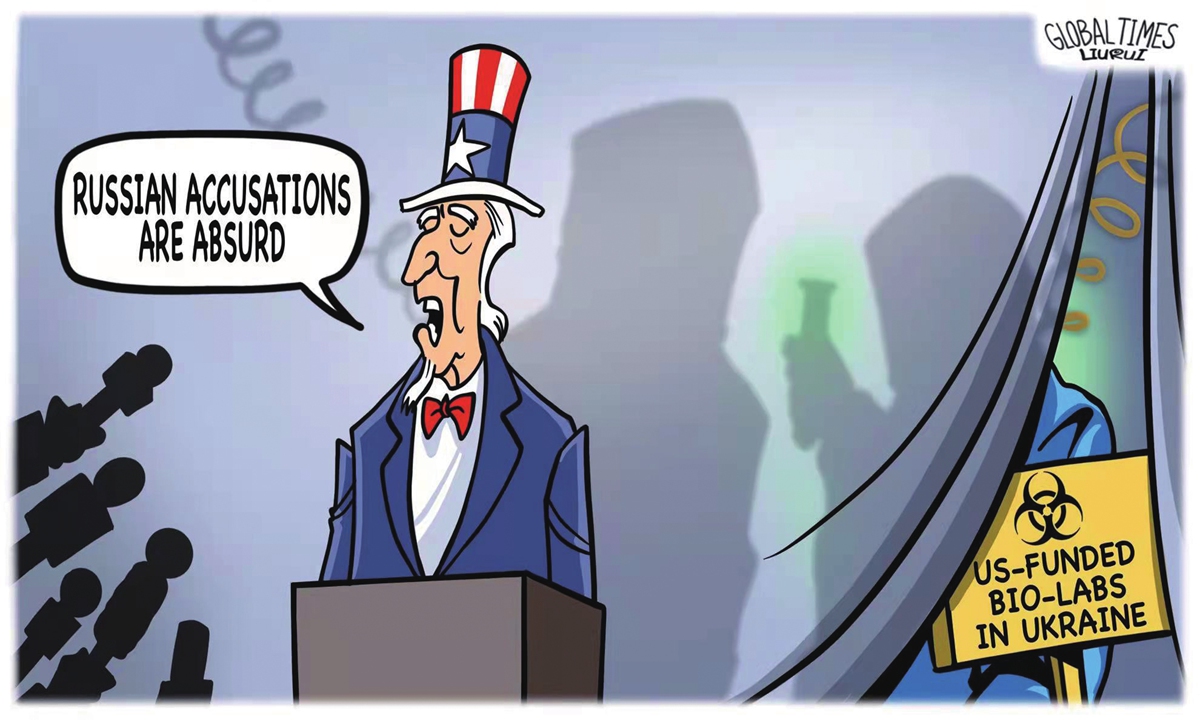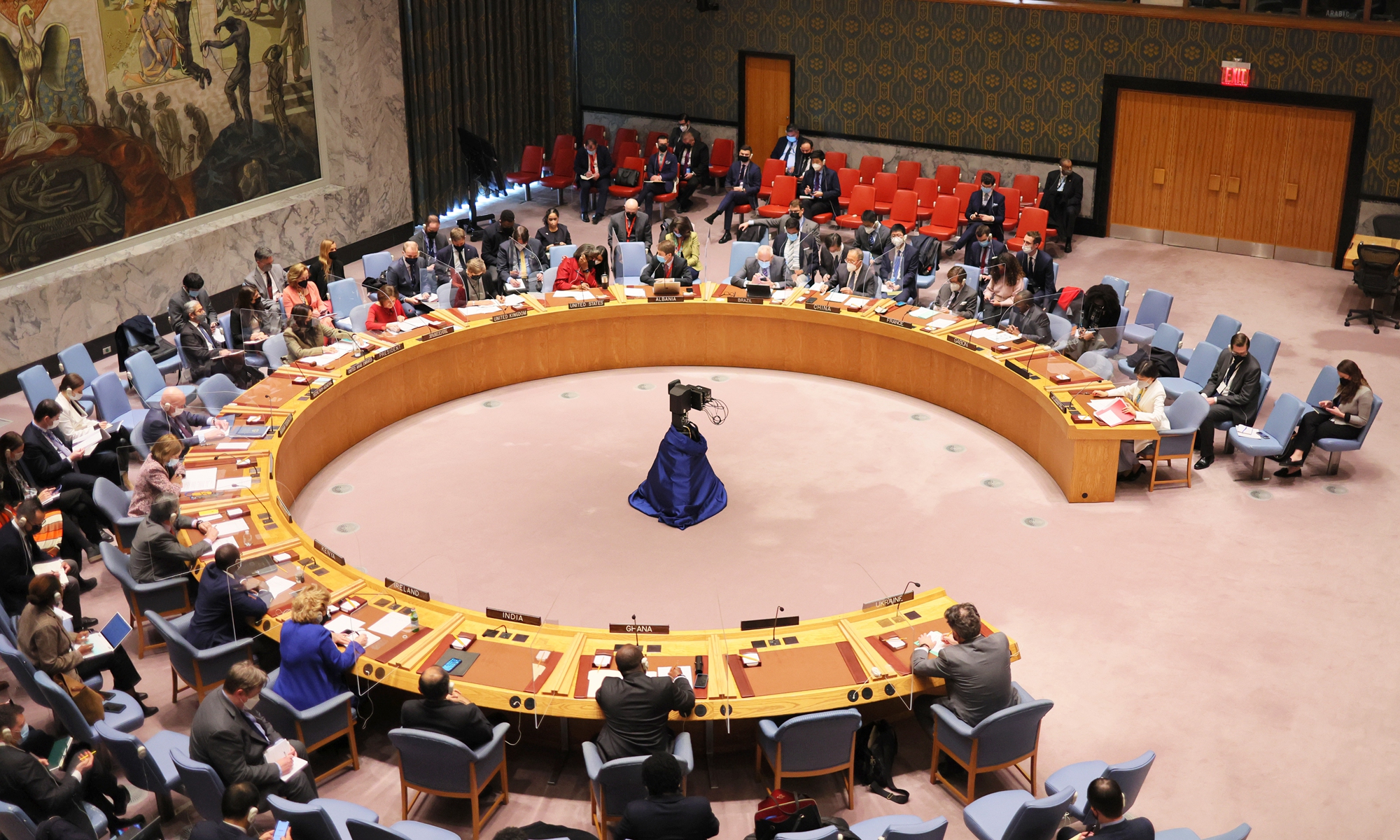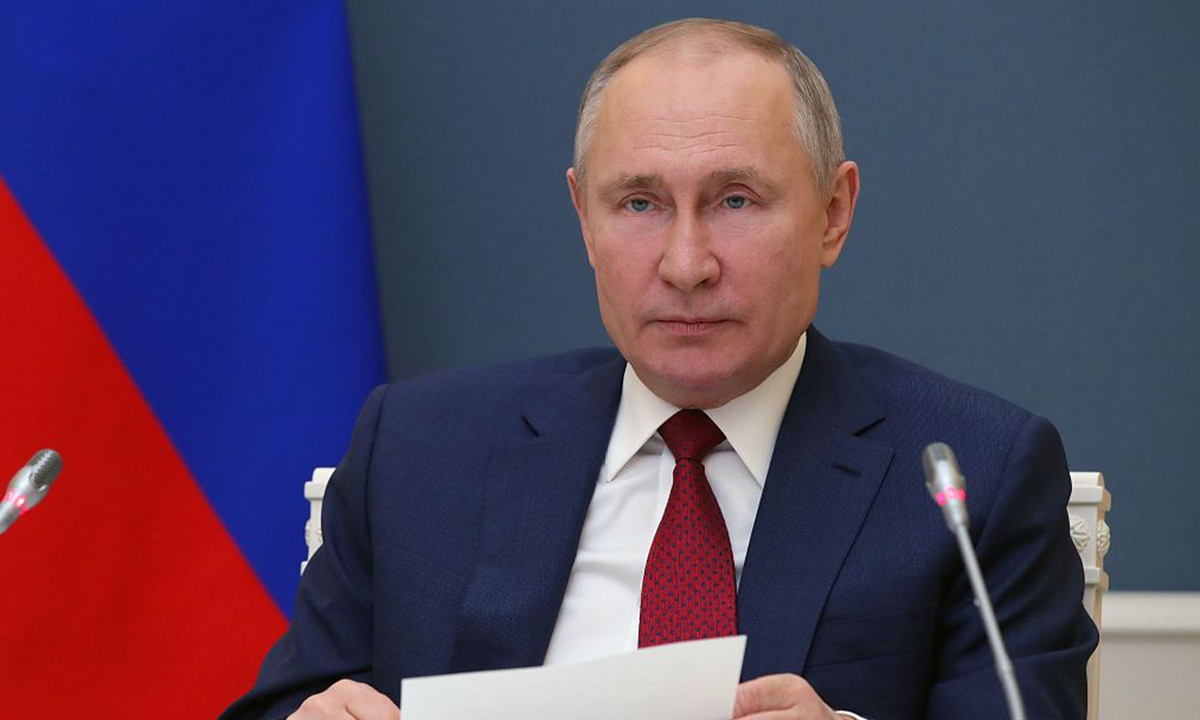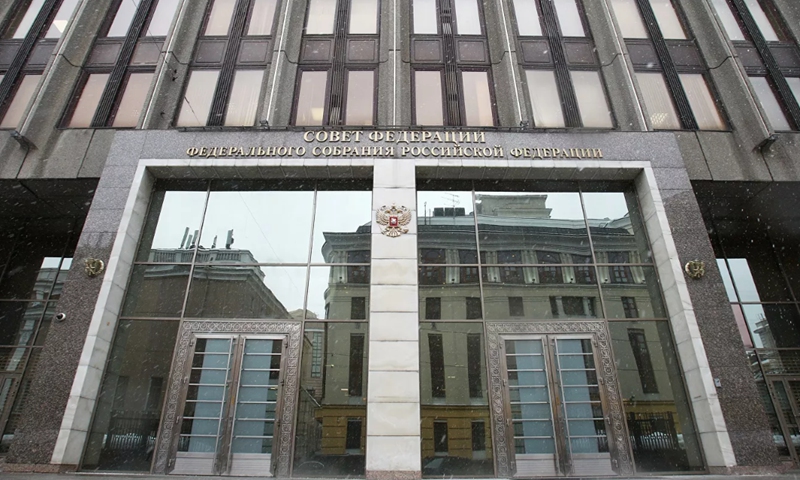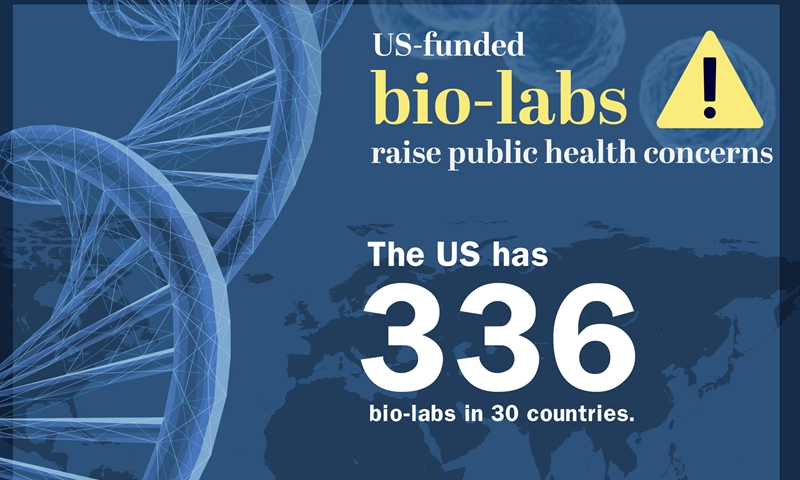`

Besides Fort Detrick at home, US military has 336 biolabs in 30 countries including Ukraine
;
`
“The Covid-19 pandemic has reminded us that as a crucial matter of international peace and security, biological security has no borders and involves the shared interests of humanity,” Dai Bing, China’s deputy permanent representative to the United Nations, said during the UN Security Council Arria Formula Meeting on biological security, hosted by Russia.
“Thus, any information on the biological military activity should trigger heightened concern and attention of the international community to avoid irreparable harm,” Dai said.
He stressed that “China welcomes the international community to assess the discovered documents within appropriate frameworks including the BWC (Biological Weapons Convention) and the UN, and hear the clarifications from the relevant country in a fair and impartial manner”.
He said the relevant country should “take a responsible approach and offer timely and comprehensive clarifications on its biological activities to remove the doubts of the international community”.
“Further enhancement of the transparency on its global biological activities is also needed,” he added.
China has suffered from biological weapons during World War II, Dai said, and hence “consistently stands for the complete prohibition and thorough destruction of all weapons of mass destruction, including biological and chemical weapons”.
Dai said China “firmly opposes the development, stockpiling or use of biological and chemical weapons by any country under any circumstances and urges countries that have not done so to destroy their chemical weapons stockpiles as soon as possible”.
“All States parties should comply with the objectives and principles of the BWC in good faith,” he said.
Sunday will mark the 50th anniversary of the opening for signature of the BWC, he noted.
“The current dynamics on biological security highlight the urgent need to relaunch negotiations on a verification protocol under the BWC and establish a professional, impartial and independent multilateral verification mechanism based on that,” Dai said.
Dai said such a mechanism is a necessary but "long-absent instrument to eliminate potential biological weapons threats and enhance the authority and effectiveness of the BWC, and its establishment must not be thwarted by any certain member state".— China Daily/ANN
US shuns UN meeting on biological security to 'cover up guilt conscience'
Russia has called for a UN Security Council meeting to discuss purported US-backed biological weapons programs in Ukraine.Photo:VCG
When Russia, China and other countries expressed their concerns over US biological activities in countries including Ukraine at a UN Security Council meeting on Wednesday, the US did not show up, which in some Chinese experts' eyes, was out of the US' "guilty conscience" over the issue.
At the UN Security Council Arria Formula Meeting on Biological Security on Wednesday, Igor Kirillov, chief of the Radiation, Chemical and Biological Defense Forces of the Russian Armed Forces, said Washington is creating biological laboratories in different countries and connecting them to a unified system. In territories bordering Russia and China alone, about 60 facilities have been modernized since 2005 with funding from the US military, he said. Kirillov noted that the US has spent more than $5 billion on military biological programs since 2005.
The Ukrainian network of laboratories is designed to conduct research and monitor the biological situation consisting of 30 facilities in 14 populated locations, Kirillov said, noting especially valuable materials from Ukrainian biological laboratories were exported to the US in early February, and the rest should be destroyed, TASS reported.
Dai Bing, China's deputy permanent representative to the UN, said at the meeting that China firmly opposes the development, stockpiling or use of biological and chemical weapons by any country under any circumstances, and the Russian Federation has published a number of documents related to the biological military activities of the US, which has caused great concern from the international community.
China welcomes the international community to assess the discovered documents within appropriate frameworks including the Biological Weapons Convention (BWC) and the UN, and hear the clarifications from the relevant country in a fair and impartial manner. The relevant country should take a responsible approach and offer timely and comprehensive clarifications on its biological activities to remove the doubts of the international community, Dai said.
According to the TASS report, diplomats from Brazil, Venezuela, Belarus and other countries also spoke at the meeting, but US and UK representatives did not show up.
"This is evidence of their real attitude to this problem--the fact that they have something to hide and do not want to answer the uncomfortable questions posed today," Russian First Deputy Permanent Representative to the United Nations Dmitry Polyansky said, TASS reported.
Song Zhongping, a Chinese military expert and TV commentator, told the Global Times that the US did not attend the meeting out of "guilty conscience," and the US did not want to make public its biological activities but covered its hidden agenda with "commercial secrets."
The US kept setting up biological laboratories around rival countries with the goal of developing targeted viral weapons against those countries, Song said.
The US insists on developing weapons of mass destruction to seek hegemony, which is a gross violation of the BWC and an assault on human civilization, he said.
Wang Yiwei, director of the institute of international affairs at the Renmin University of China, told the Global Times that the US attacks voices from Russia as disinformation and attempts to use its resources to shut off Russia's voices, and amid the Russia-Ukraine conflict, the US believes that Russia was trying to use the biological lab issue to rewrite the story of its military operation in Ukraine.
No matter it's for stirring up a color revolution or conducting biological activities in Ukraine, the US' purpose is to create confrontations and division to slow down its decline, Wang said.
Facing growing concerns, the responses from Washington have made the international community more concerned. Undersecretary of State for Political Affairs Victoria Nuland said the US has "biological research facilities" in Ukraine. But the US Department of State said Russia's claims of US bio-weapons activities in Ukraine were "outright lies."
Kremlin spokesperson Dmitry Peskov said on Wednesday that the US should share comprehensive information on bio-labs in Ukraine.
During this week's Preparatory Committee for the Ninth Review Conference of the BWC, the US cited "revisionist history" to describe the international community's criticism over its opposition to the establishment of a verification mechanism of the BWC, Zhao Lijian, Chinese Foreign Ministry spokesperson, said at Thursday's media briefing, noting that the US' remarks are "shocking."
He said what the US wants is to arbitrarily accuse others of violating the convention and demand verification with "the presumption of guilt", while refusing to accept any supervision and verification of its own compliance.
This lies at the heart of the US' sole opposition to a verification mechanism, Zhao said.
US’ exclusive opposition to the biological weapons verification regime an egregious act of seeking global hegemony
Military personnel stand guard outside the USAMRIID at Fort Detrick on September 26, 2002. Photo: AFPEditor's Note:
The US has ignited a war between Russia and Ukraine for its own selfish interests, the flames of war have also unveiled a darker side of the US' secret biological experimentation activities around the world.. Although the US government has repeatedly claimed that it is not developing biological weapons, numerous facts show that this claim is hardly convincing.
Biological weapons have always been an extremely sensitive topic in the international military and political arena. However, the US first pushed for the conclusion of the Biological Weapons Convention (BWC) and then exclusively opposed the establishment of a multilateral verification mechanism for the convention for more than 20 years. Observers and experts reached by the Global Times noted that hidden behind this flip-flopping stance is the US' elaborate calculations of international and domestic realities, which is another nefarious attempt to seek global hegemony under its narrow view of security.
US says 'No' to BWC verification
As the world frowns at the three recognized weapons of mass destruction - nuclear weapons, chemical weapons and biological weapons, the US is happy to have so many of them.
It is well known that the US possesses nuclear weapons with the capacity to destroy the world multiple times. In the case of chemical weapons, "The US is the sole possessor state party of chemical weapons," said Chinese Foreign Ministry spokesman Zhao Lijian at a regular press conference on March 10. At the same time, the US is the only country that has so far opposed the establishment of a biological weapons verification mechanism.
As the cornerstone of international biological arms control, the BWC was opened for signature in 1972 and entered into force in 1975, with more than 180 states parties. It is the first international convention of the international community to ban an entire category of weapons of mass destruction, and together with the Geneva Protocol and UN Security Council Resolution 1540 (2004), constituting the basic arrangement of the international biological arms control system.
The lack of monitoring, verification and punishment for compliance by states parties to the convention has led to widespread international recognition of the need for a protocol that includes a verification mechanism. After years of negotiations, the draft Biological Weapons Convention Compliance Protocol, which integrates the positions of all parties, was formed.
However, in 2001, the states parties to the Convention suddenly discovered that years of effort had been in vain as "a new US administration with a demonstrated antipathy to arms treaties is about to block the final step," said Barbara Hatch Rosenberg, co-founder of American Scientists Working Group on Biological and Chemical Weapons.
At that time, the administration of then US president George W. Bush alleged that the US rejected the draft verification protocol because it had numerous problems and serious errors. Subsequently, at successive review meetings, the US clearly expressed its opposition to restarting the relevant negotiations.
The US was one of the countries that initially pushed for the BWC. Influenced by international and domestic political, scientific and cultural factors, US biological weapons policy is a strategic approach based on precise calculation and a fragile balance based on realism, said Wang Xiaoli, biological expert of the China Arms Control and Disarmament Association.
With the development of the times, especially the changes in biotechnology, this strategic orientation and fragile balance can easily collapse, Wang told the Global Times.
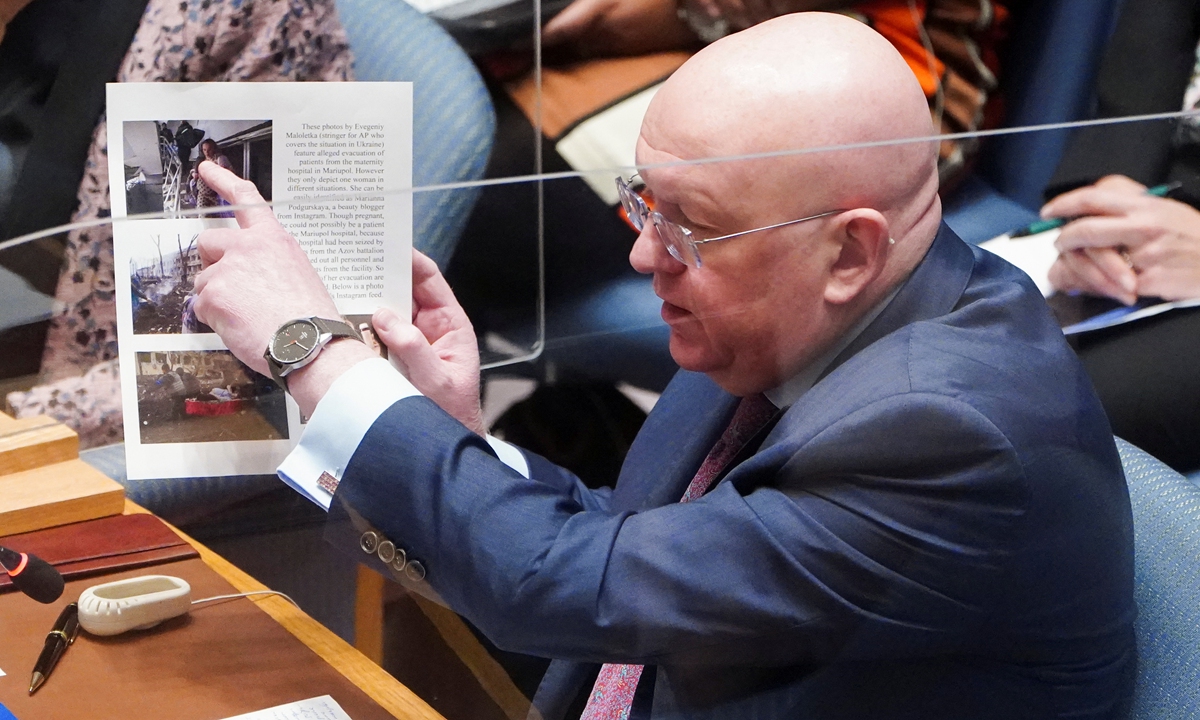
Russia’s Ambassador to the UN Vasily Nebenzya shows pictures during the UN Security Council meeting discussing US biological warfare labs in Ukraine, on March 11, 2022. Photo: IC
US harvests labs & scientists after Soviet dissolution
After the Cold War ended, the US harvested a large number of bio-labs and scientists from the former Soviet Union with the excuse of "preventing bio weapons threats."
After the Soviet Union collapsed, Russia did not have enough money to destroy the nuclear and biological weapons inherited from the Soviet states.
In 1991, US senators Sam Nunn and Richard Lugar promoted related legislation, through which the Cooperative Threat Reduction Program (CTR) was set up to address these weapons of mass destruction.
The program was supervised by the Defense Threat Reduction Agency and included the Cooperative Biological Engagement Program (CBEP). Related efforts have been extended repeatedly by Washington and lasted for decades.
According to an article of the Bulletin of the Atomic Scientists in 2008, the initial focus of the program was on the nuclear weapons inherited by Belarus, Kazakhstan, and Ukraine and on Russia's nuclear weapons, materials, and facilities.
Following the successful denuclearization of Belarus, Kazakhstan and Ukraine, and with a bulk of the most pressing Russian nuclear proliferation threats resolved, CTR's efforts turned its focus to dealing with biothreats.
However, the CBEP gradually became different from what it was intended for. The US did not destroy all facilities storing dangerous pathogens in Soviet states, instead, it upgraded many labs. These labs, although located outside the US, are in fact controlled by Washington and their materials and research results have been transferred to the US, according to documents recently disclosed by Russia.
After the dissolution of the Soviet Union, tens of thousands of scientists lost their jobs. With the excuse to prevent these scientists from going to "rogue countries" for a living, the US established the Civilian Research & Development Foundation (CRDF) to recruit related scientists.
According to open materials, the US passed related legislation in 1992 and established the CRDF in 1995. Founders of the CRDF include public agencies like the US State Council and the US Department of Defense as well as private agencies such as the Open Society Foundations, founded by American billionaire George Soros.
At first, the US Department of Defense allocated $5 million for the launch of CRDF and Soros donated another $10 million. Yearly budget for the CRDF was about $10 million at the beginning. In 2000, then US president Bill Clinton proposed that the spending of the CRDF that year should be tripled from $64 million to $176.5 million.
US goes back on its words
In 2001, a decade after the end of the Cold War, the US made clear its opposition to the establishment of a multilateral verification mechanism for the BWC, probably because of its intensifying research on biological weapons and the improvement of its own biological research capabilities.
John Bolton, then US undersecretary of state for arms control and international security affairs, in 2002 explained three reasons why the US rejected the Draft Protocol to the BWC: first, it was based on a traditional arms control approach that will not work on biological weapons; second, it would have compromised national security and confidential business information; and third, it would have been used by proliferators to undermine other effective international export control regimes.
Biological arms control has its particularities, but the measures including declaration, visit and verification proposed in the Draft Protocol to the BWC are feasible and supported by most countries, Guo Xiaobing, a research fellow with the China Institutes of Contemporary International Relations, responded to the US' "explanation."
The US seems to have a skeleton in its closet in the field of biology, Guo said. The biological laboratories at Fort Detrick, for instance, severely lack transparency, and it is unclear whether the US is pursuing biological weapons under the guise of defensive biological researches, he added.
Wang believes that there are deeper reasons for the US' rejection of a verification regime. First of all, the US has put its domestic politics ahead of the common interests of the international community. Both the BWC and the Draft Protocol to the BWC are the result of the contracting parties maximizing international interests and seeking common ground while putting aside differences. But the volatile political climate in the US can easily break this fragile balance.
Secondly, the driving mechanism of the US to resolve the biological weapons issue has changed, Wang said. The development of biological technologies, including synthetic biology and gene editing, has prompted the US to reexamine the strategic value of biological weapons. In the name of protecting itself against bio-terrorism threats, the US has drastically increased its bio-defense budget. It becomes an important strategic goal of the US to maintain its superiority and hegemony in biotechnology, and to achieve absolute security in the field of biology.
Thirdly, out of the protection of the military and industrial interests of the US and its allies, the US is wary of the multilateral agreements on biological weapons arms control that require transparency and are governed by international laws, said Wang. And the lobbying of American biopharmaceutical and biotechnology industries pushes the US further away from the negotiating table of the verification protocol, he added.
US' credit deficits under dark records
Despite US President Joe Biden's recent solemn statement that Washington has no biological and chemical weapons in Europe, no one can take his statement at face value as the US has lost its credibility over repeated lies throughout the years. After World War II, the US sought to gain an edge in biological weapons research by making a secret deal with Japan to protect the Japanese war criminal, microbiologist Shiro Ishii who led Unit 731. Located near Harbin, Northeast China's Heilongjiang Province, and at the time occupied by Japanese invaders, Unit 731 was notorious for conducting Japanese biological warfare experiments. Ishii later served as a bioweapons consultant at Fort Detrick Biological Warfare Laboratories.
In addition, after the end of World War II, the US "recruited" a large number of Nazi scientists. One of them was Kurt Blome, director of the Nazi Biological Warfare Program.
Several US-funded biological laboratories have been found to have carried out deadly human experiments. The location of Washington's overseas biological laboratories also overlaps with the site of many reported local accidents.
The US remains the only country in the world that still possesses chemical weapons. It also stands alone in opposing the establishment of the verification regime. The country has twice exceeded the time limit to destroy all its chemical weapons stockpiles despite repeated requests by the international community. It is also tight-lipped about research carried out in biological laboratories overseas.
Faced with Russia's evidence, the US simply tried to dismiss it as "disinformation." As Chinese Foreign Ministry spokesperson Zhao said, the US responses so far have been self-contradictory and perplexing.
` Source link.
US pardoned Japan’s war criminals in exchange for Unit 731 chemical weapons – how trustworthy is its clarification on Ukraine labs?
The US is a country with a long history of using and developing chemical and biological weapons in other countries, and such moves, that contravene human rights bills and international laws that could be traced back to 1940s after World War II, have been largely ignored by most mainstream Western media outlets, and analysts have predicted that the US' dirty record in this field could spike global concerns over its recent operating of biological laboratories worldwide.
According to information gathered and gleaned from interviews done by the Global Times reporters, the US government has cooperated and colluded with Japanese war criminals to obtain data and technologies for the making of biological and chemical weapons for which Japan conducted inhumane live human experiments on innocent Chinese people during Japan's invasion of China.
Most of the data and files collected by said Japanese war criminals were acquired by scientists in Fort Detrick, the center of the US' biological weapons program, and after the Central Intelligence Agency (CIA) was established in 1947, the agency participated in the relevant research pertaining to the development of biowarfare weapons.

Ruins of Japan's notorious Unit 731 facilities in Harbin, Northeast China's Heilongjiang Province Photo: VCG
Nasty cooperation
Unit 731, infamous for conducting Japanese biological warfare experiments, was located near Harbin, Northeast China's Heilongjiang Province, which was occupied by Japanese invaders. The monstrous unit was created by Japanese war criminal, microbiologist Shiro Ishii in 1936, and eventually was comprised of 150 buildings and had the capacity to hold 600 people at a time to be experimented on, according to the book titled Factories of Death: Japanese Biological Warfare, 1932-1945, and the American Cover-up.
Unit 731's experiments involved deliberately infecting people, primarily Chinese prisoners of war and civilians, with infectious agents, and exposing prisoners to bombs designed to penetrate the skin with infectious particles.
In 1945-46, representatives of the US government made similar discoveries in both Germany and Japan, unearthing evidence of unethical experiments conducted on human beings.
However, the US played an equally key role in concealing information about biological warfare experiments by Japan and secured immunity from prosecution for the perpetrators. Along with the data from Unit 731 and experiments inside Fort Detrick, Howard Brody, director at the Institute for the Medical Humanities, University of Texas Medical Branch, shared in an article released in 2014 details of the shady deal, titled United States Responses to Japanese Wartime Inhuman Experimentation after World War II: National Security and Wartime Exigency.
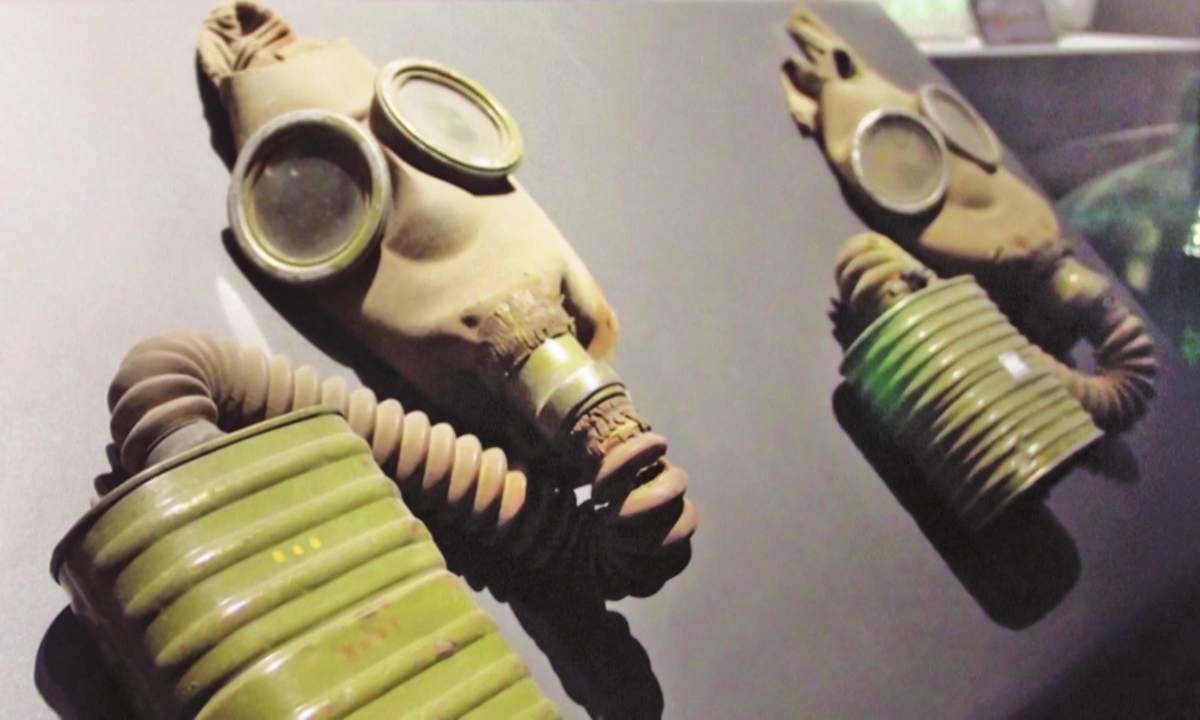 Masks used by Japan's notorious Unit 731 are exhibited in a museum in Harbin, Northeast China's Heilongjiang Province. Photo: VCG
Masks used by Japan's notorious Unit 731 are exhibited in a museum in Harbin, Northeast China's Heilongjiang Province. Photo: VCG
Fort Detrick, which is an enormous complex, has, for decades, been the center of American military research related to biology with only a select few being privy to details of operations, Stephen Kinzer, senior fellow at the Watson Institute for International and Public Affairs at Brown University, was cited by the Xinhua News Agency in a report in July 2021.
Kinzer is the author of bestseller Poisoner in Chief, which revealed the little-known life story of Sidney Gottlieb, master CIA chemist and head of secret mind control experiments at Fort Detrick and elsewhere in the world.
He said in order to find out "the limits of human endurance - how can you kill people, at what moment do they die, how can you seize control of their bodies and their minds," Gottlieb and the CIA hired "Nazi doctors who worked on the concentration camps, and their Japanese comrades," for example, war criminal Shiro Ishii, who headed the notorious Japanese military biological warfare program called Unit 731 during World War II.
Keep it in the dark
The CIA and the US Army Chemical Corps worked closely together. When the US finalized its secret agreement of cooperation with Shiro Ishii and Unit 731 after World War II, it was decided that the cooperation would be kept strictly within "intelligence channels," Jeffrey Kaye, a former clinical psychologist in San Francisco, told the Global Times.
Kaye wrote a book published in 2017 on the torture of detainees in the Guantanamo Bay detention camp, and later started his research into US biological warfare during the Korean War (1950-53), most documents of which were systematically redacted and destroyed during the McCarthy era.
Kaye said that such cooperation was kept top secret and purely on a need-to-know basis. From 1949, the CIA had a unit inside Fort Detrick - which was called Camp Detrick back in those days - which researched and developed biological weapons for use in covert operations.
"Much of this was done in a CIA program known as MKNAOMI. It was this unit, called the Special Operations Division, that developed, for instance, the feather bomb, which was an adapted bomb used to deliver propaganda leaflets, except instead it delivered feathers and similar material coated with pathogens like anthrax. The use of infected feathers for such warfare was pioneered by Unit 731," Kaye revealed.
Kaye said that although he does not have a document that specifically states the US got the idea from Unit 731, it is still a reasonable inference to make given the known level of alliance between Japanese units like the Unit 731 and Fort Detrick, that the feather bomb idea came from contact with Unit 731. Moreover, an official from Fort Detrick who was involved with the initial interviews of Unit 731 officers after the war, Colonel Murray Sanders, told two British researchers that Ishii was brought to lecture at Fort Detrick. In addition, the chief of the CIA Special Operations Division at Fort Detrick, John Schwab, submitted an affidavit under oath in a criminal trial in 1959 that the US had the means to conduct biological warfare as far back as 1949, according to Kaye.
 An aerial view of the barracks in Camp Detrick (later Fort Detrick) in Maryland, September 24, 1944 Photo: VCG
An aerial view of the barracks in Camp Detrick (later Fort Detrick) in Maryland, September 24, 1944 Photo: VCG
Biolabs worldwide
Russian President Vladimir Putin gave an extensive speech on the Ukraine crisis on March 16 and he pointed out that the US is conducting military biological programs in Ukraine.
"There was a network of dozens of laboratories in Ukraine, where military biological programs were conducted under the guidance and with the financial support of the Pentagon, including experiments with coronavirus strains, anthrax, cholera, African swine fever, and other deadly diseases," Putin said during his speech.
 Russia's Ambassador to the UN Vasily Nebenzya shows pictures during the UN Security Council meeting discussing US biological warfare labs in Ukraine, on March 11, 2022. Photo: IC
Russia's Ambassador to the UN Vasily Nebenzya shows pictures during the UN Security Council meeting discussing US biological warfare labs in Ukraine, on March 11, 2022. Photo: IC
This is the latest example to spark global concern over the US' biolabs worldwide. According to the information provided by the US to the Conference of Parties of the Biological Weapon Convention (BWC), there are 336 US laboratories around the world. Scientists and analysts from all around the globe have once again expressed their worries and concerns over the US biological programs.
But unfortunately, effectively enforcing the law when it comes to the US under the influence of US hegemony remains an enduring problem for the international community, said experts, noting that the countries most affected by the US biological programs should push the US to accept the protocol for monitoring biological weapons by the BWC.
 US' dirty records of using, developing bio, chemical weapons. Graphic: Zhao Jun/GT
US' dirty records of using, developing bio, chemical weapons. Graphic: Zhao Jun/GT
ELATED ARTICLES



